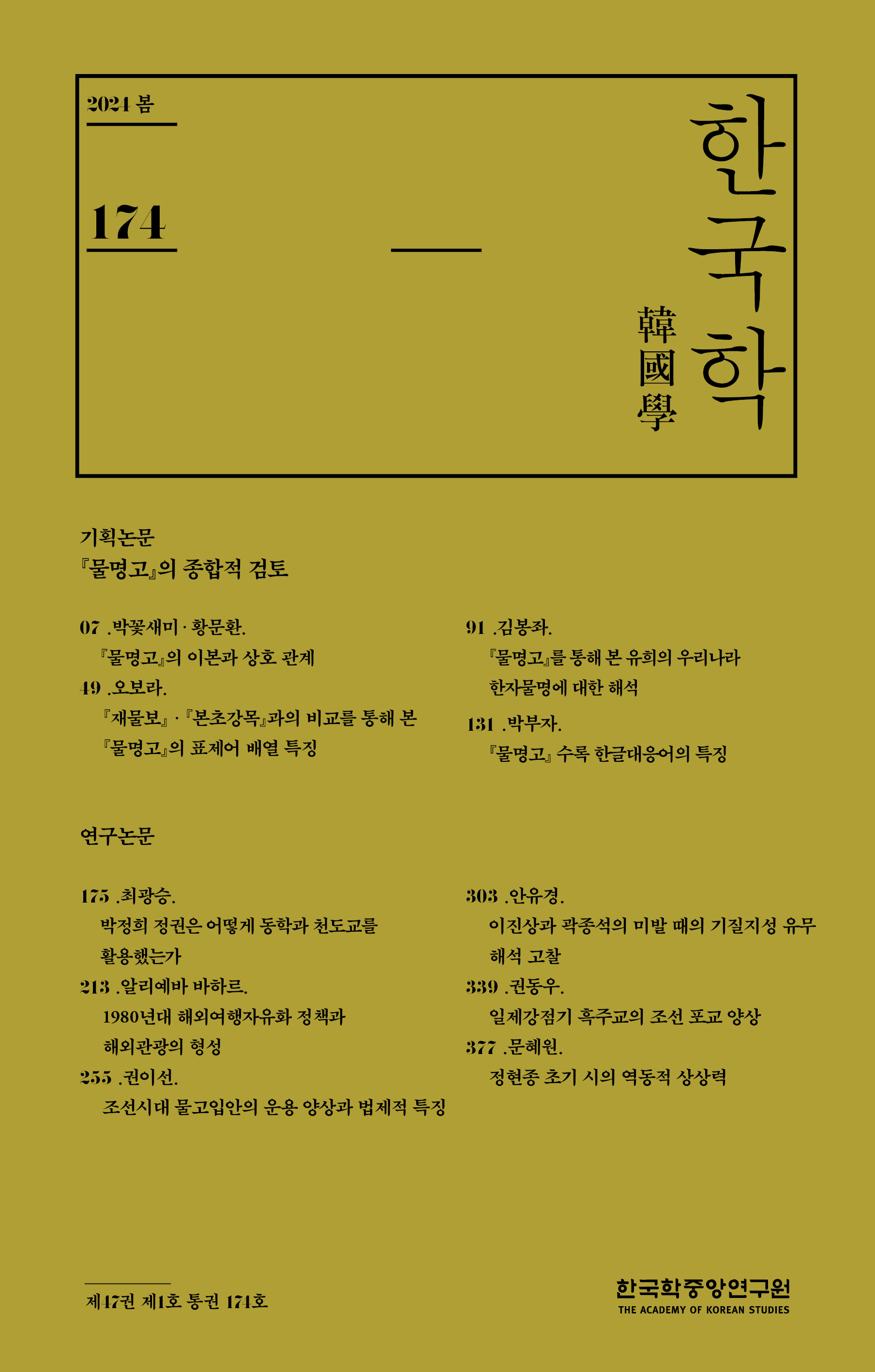
- P-ISSN 2671-8197
- E-ISSN 2733-936X
이 글은 <서대문독립공원>을 둘러싼 다양한 근대의 기억을 다루고 있다. <서대문독립공원>은 <서대문형무소>, <독립문>, <서대문형무소역사관>과 같은 역사 유적, 기념물, 박물관일 뿐만 아니라 <서대문독립민주축제>의 장소이며, 지하철역, 시민편의시설 등이 모여 있는 공간이다. 이 글은 그 공간적 기원에서부터 시작하여 현재의 모습에 이르기까지, <서대문독립공원>이 어떠한 정치적·문화적 맥락 속에서 의미화의 과정을 거쳐 오고 있는지 살펴본다. 이를 위해 이 글은 ‘기억’ 개념에 초점을 두고 있다. 기억은 과거에 대한 내용이자 형식이며 학제 간의 관점에서 다양한 문화적 실천에 관한 시사점을 제공하기 때문이다. 이러한 논의를 전제로, 이 글은 <서대문독립공원>을 근대로의 열망, 근대의 기제, 근대와 공론장이라는 관점에서 다룬다. 이를 위해 이 글에서는 <서대문독립공원>에 관한 ‘역사적 사실’에 대한 검토와 더불어 <서대문독립공원>을 둘러싸고 있는 여러 담론의 형성과정과 그 의미에 대해 논의하고, 독립공원에는 근대에 관한 다양한 실천들이 공존하고 있음을 밝힌다. 아울러 <서대문독립공원>은 역사에 장악된 기억과 현재의 다양한 정치경제적 이해관계가 뒤얽히면서 끊임없이 재맥락화되고 있는 기억의 장소임을 보여준다.
This paper examines memory of modernity represented in <Seodaemun Independence Park>. <Seodaemun Independence Park> is a site where historic monuments and museum such as <Independence Gate>, <Seodaemun Prison>, <Seodaemum Prison History Hall> are located and <Independence and Democracy Festival> takes place every year. This paper takes a closer look at how the site has been historically developed, transformed, and made its meaning in the changing political and cultural contexts. From a perspective of “memory” as a cultural practice, it argues that the site surrounding <Seodaemun Independence Park> represents multiple modernities: aspiration for modernity and modernization; modern control mechanism; public sphere of political struggle. This paper examines ‘historical facts’ about the park as well as developments of various discourses surrounding it. It finds that various practices regarding modernities coexist in this place which is constantly re‒contextualized with memory preoccupied with history and political‒economic interests having been intertwined.
김백영, 「상징공간의 변용과 집합기억의 발명: 서울의 식민지 경험과 민족적 장소성의 재구성」. 『공간과 사회』28호, 2007, 188‒221쪽.
김백영·김민환, 「학살과 내전, 공간적 재현과 담론적 재현의 간극: 거창사건추모공원의 공간 분석」. 『사회와 역사』78집, 2008, 5‒33쪽.
김세민, 「迎恩門, 慕華館의 건립과 獨立門, 獨立館으로의 변천」. 『향토서울』82권, 2012, 141‒178쪽.
김은경, 「일본군 ‘위안부’ 기념관의 ‘위안부’ 재현과 기억 정치」. 『한국학연구』35집, 2010, 177‒203쪽.
김정동, 「심의석이 세운 독립문과 독립관을 중심으로」. 『한국건축역사학회 2010년추계학술발표대회논문집』, 한국건축역사학회, 2010, 109‒126쪽.
김태중, 「개화기 궁정건축가 사바찐에 관한 연구 고용경위와 경력및 활동환경을중심으로」. 『대한건축학회』12권 7호, 1996, 107‒119쪽.
김형곤, 「한국전쟁의 공식기억과 전쟁기념관」. 『한국언론정보학보』통권 40호, 2007, 192‒220쪽.
류현종, 「역사적 장소 학습과 과거 기억의 문제 ‒ 초등학생들의 역사적 장소 재현분석을 중심으로」. 『역사교육연구』2호, 2005, 177‒219쪽.
미셀 푸코 저, 오생근 역, 『감시와 처벌(Surveiller et punir)』. 나남출판, 2003.
손은하·공윤경, 「상징 조형물과 상징공간에 이미지화된 지역성 ‒ 마산의 ‘민주화의성지’와 ‘문학의 도시’ 이미지를 중심으로」. 『인문콘텐츠』17호, 2010, 419 ‒ 446쪽.
신용하, 「독립문·독립관·독립공원의 건립과 변천」. 『향토서울』59권, 1999, 77‒105쪽.
양병일, 「서대문형무소의 상징 읽기」. 『사회와 교육』45권 4호, 2006, 59‒82쪽.
여문환, 『동아시아 전쟁기억의 국제정치: 한·중·일 전쟁기념관을 가다!』. 한국학술정보, 2009.
원도연, 「동학농민혁명 기념사업의 사회성과 기념공간 연구」. 『지방사와 지방문화』10권 1호, 2007, 261‒288쪽.
이은지·조철호·박해정, 「다크투어리즘 서비스경험이 방문객의 방문효과, 만족에관한 연구‒서대문형무소 역사관을 중심으로」. 『대한경영학회지』25권 7호, 2012, 2999‒3018쪽.
이정규, 『나의 꿈 나의 삶 서대문과 더불어』. 기파랑. 2004.
정호기, 「전쟁 상흔의 치유 공간에 대한 시선의 전환」. 『민주주의와 인권』8권3호, 2008, 183‒212쪽.
최정기, 「5·18기념공간과 사회적 갈등‒기념공간 관련 논쟁 및 갈등을 중심으로」. 『민주주의와 인권』8권 1호, 2008, 51‒78쪽.
태지호, 『기억문화연구』. 커뮤니케이션북스, 2014.
태지호·정헌주, 「중국의 항미원조기념관을 통해서 본 한국전쟁의 기억과 정치적함의」. 『한국정치학회보』48집 4호, 2014, 297‒317쪽.
한홍구, 『한홍구와 함께 걷다』. 검둥소, 2009.
허버트 허시 저, 강성현 역, 『제노사이드와 기억의 정치: 삶을 위한 죽음의 연구(Genocide and the Politics of Memory: Studying Death to Preserve Life)』. 책세상, 2009.
Bennett, Tony, The Birth of the Museum: History, Theory, Politics. London:Routledge, 1995.
Bruno, Giuliana, “Havana: Memoirs of Material Culture.” Journal of Visual Culture, Vol. 2, No. 3, 2003, pp. 303‒324.
Ceuster, Koen de, “The Changing Nature of National Icons in the Seoul Landscape.” The Review of Korean Studies, Vol. 3, No. 2, 2000, pp. 73‒103.
Dickinson, Greg, Carole Blair, and Brian L. Ott, Places of Public Memory:The Rhetoric of Museums and Memorials. Tuscaloosa: University Alabama Press, 2010.
Lennon, John. and Foley, Malcolm, Dark Tourism: The Attraction of Death and Disaster. London: Continuum, 2000.
Phillips, Kristina Kate, A Museum for the Nation: Publics and Politics at the National Museum of India. A Dissertation for the Degree of Doctor, Minneapolis: The University of Minnesota, 2006.
Rowe, Shawn M., James V. Wertsch, and Tatyana Y. Kosyaeva, “ Linking Little Narratives to Big Ones: Narrative and Public Memory in History Museums.”Culture and Psychology, Vol. 8, No. 1, 2002, pp. 96‒112.
Thomas, Nicholas, Entangled Objects: Exchange, Material Culture, and Colonialism in the Pacific. Cambridge, Massachusetts: Harvard University Press, 1991.